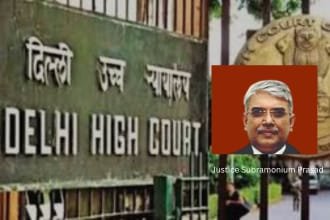In a landmark ruling, the Delhi High Court has issued comprehensive directions aimed at safeguarding the rights and properties of orphaned minors, stressing the need for courts to adopt a compassionate and child-centric approach while dealing with guardianship applications. The judgment, delivered by Justice Subramonium Prasad, comes in response to two writ petitions filed on behalf of minor children who lost their parents under tragic and traumatic circumstances.
Case Background: Tragedy and Trauma
The first case involved two minors who were placed in Udhyan Ghar Boys Home following a horrific domestic incident. The petitioners had returned home with their mother when their intoxicated father attacked them with a knife. One minor was stabbed in the forearm, and their mother, upon rushing to the scene, was fatally attacked. Following the incident, the father committed suicide. The Child Welfare Committee (CWC) placed the children in institutional care. Later, their paternal relatives sought to contact them, but the children resisted, citing lack of support during their family crisis.
In the second case, minors from Village Cottage Home were victims of repeated physical abuse by their father, who was allegedly addicted to alcohol. The situation escalated when a cousin reported the violence to the police. A subsequent police visit confirmed the abuse, and one of the minors was found injured. The father passed away two years later, and the children were abandoned by their mother much earlier. The property involved in this case was ancestral and already divided among the father and his brothers.
In both petitions, the minors sought protection for the movable and immovable assets left behind by their deceased parents. They alleged that their relatives were attempting to usurp these properties.
Court’s Observations: Minors’ Rights Must Be Protected Proactively
Justice Subramonium Prasad emphasized that courts must act as “zealous guardians” of minor children’s interests. Recognizing the vulnerability of children in such scenarios, the bench observed:
“The case of children who are helpless victims of circumstances must be dealt with compassion and a sympathetic attitude. Efforts must be made to ensure that the properties are immediately secured so that they are not frittered by unscrupulous relatives who like vultures want to prey on the meagre belongings left behind for the children.”
The Court held that the rights of minors, especially those who have been orphaned, must be prioritized and protected by the judiciary and state authorities alike.
Key Directions Issued by the Delhi High Court
To streamline the process and ensure timely and effective guardianship and property protection, the Delhi High Court issued the following key directions:
- Unified Jurisdiction in Guardianship Cases
Any application filed by the District Magistrate for guardianship over a minor’s property must be heard by the Family Court already dealing with the guardianship of the child. This ensures consistency in judicial orders and avoids conflicting directions. - Timely Interim Relief
Family Courts must pass interim orders for protecting a child’s property within four weeks from the date of the application, as per Section 12 of the Guardians and Wards Act, 1890. The urgency reflects the need to prevent asset misuse or illegal possession. - Child-Centric Legal Approach
Family Courts are required to adopt a child-centric approach. A separate counsel must be appointed to represent the child’s interests, ensuring that their views are taken into account during the proceedings. - Continuous Oversight by Family Court
The guardianship case should remain pending until the child attains majority. The guardian must submit annual accounts regarding property and financial matters, which will be monitored by the Family Court to ensure transparency and accountability. - No Hindrance to Adoption Process
If a child is eligible for adoption under the Juvenile Justice Act, 2015, and the Adoption Regulations, 2022, then the pendency of guardianship or property-related applications must not hinder or delay the adoption process. - Protection of Sibling Rights and Legal Representation
In cases involving multiple siblings, the State must protect the interests of all minor siblings and represent them in legal proceedings. The District Magistrate is empowered to contest and institute proceedings under applicable guardianship and personal laws to protect the children’s interests.
Directive to State and Family Courts
The Court has directed the Delhi Government to frame clear guidelines based on the CWC’s existing framework to standardize the process for dealing with such sensitive cases. Furthermore, the judgment has been ordered to be circulated to all relevant Family Courts to ensure consistent and immediate implementation.
Wider Implications for Child Welfare Jurisprudence
This judgment marks a significant step forward in the judicial approach to child welfare and protection of vulnerable children’s rights in India. It underlines the pressing need for:
- Speedy legal remedies in cases involving minors.
- Institutional responsibility for property protection.
- Judicial sensitivity and empathy toward traumatized children.
- An interdisciplinary approach combining law, social work, and child psychology.
Conclusion
The Delhi High Court’s decision in Master G through Legal Guardian & Anr. v. State (NCT of Delhi) serves as a vital reminder that the legal system must prioritize the welfare and dignity of children, especially when they are exposed to tragic and destabilizing life events. By emphasizing a compassionate, child-first approach and reinforcing safeguards to prevent exploitation, the judgment sets a powerful precedent in the realm of child rights and guardianship law in India.



